
Success in sales is a matter of quality and quantity.
Personalized outreach is essential if you want to stand out from the dozens of other cold messages your prospects receive every day.
But you know that most prospects won’t need your product right now. That’s why you need to reach out to hundreds of prospects each week. But you simply can’t personalize messages at that scale.
That’s where sales engagement automation platforms come in. In this article, we’ll show you how these tools can accelerate the sales engagement process and help you send hundreds of high-quality emails at once.
We even review the ten best sales engagement automation platforms.
Table of Contents:
- What is sales engagement automation?
- What are the benefits of sales engagement automation?
- The 10 best sales engagement automation platforms
- How do you know which sales engagement automation platform is right for you?
- What's next?
What is sales engagement automation?
Sales engagement fosters a meaningful connection with potential buyers at the start of the sales cycle—from finding prospects to nurturing them through emails and LinkedIn messages.
Sales engagement automation uses software and dedicated platforms to automate that outreach process, allowing sales reps to contact more prospects with less effort. What’s great about sales engagement automation tools, however, is that they let reps keep the quality of their outreach the same.
There are many different tools your reps can use to automate sales engagement. Some will help with one part of the princess, while other, more comprehensive tools can automate almost everything.
What are the benefits of sales engagement automation?
Integrating a sales engagement platform into your outbound sales process has several benefits. Here are some of the most important:
- Reps can reach out at scale. When quantity matters as much as quality, sales engagement tools empower your reps to send hundreds of personalized messages to relevant prospects daily.
- It keeps reps organized. Sales engagement automation software lets reps set up entire outreach cadences in one go. Every step can be pre-programmed and automated, so they never have to worry about missing a follow-up or wonder what action to take next.
- You can measure rep performance. Most sales engagement automation tools have built-in reporting features that let you track your team’s effectiveness. This helps reps monitor their success and allows sales managers to uncover training topics.
- Tools integrate with your sales software stack. Most sales engagement tools integrate with your CRM and other applications to eliminate manual work and allow reps to spend more time selling.
The 10 best sales engagement automation platforms
Here’s our shortlist of the 10 best sales engagement automation platforms:
- Groove by Clari
- Salesloft
- Mailshake
- Klenty
- Outreach
- Lemlist
- Reply
- Yesware
- VanillaSoft
- Apollo.io
Now, let’s look at each of them in more detail.
1. Groove by Clari
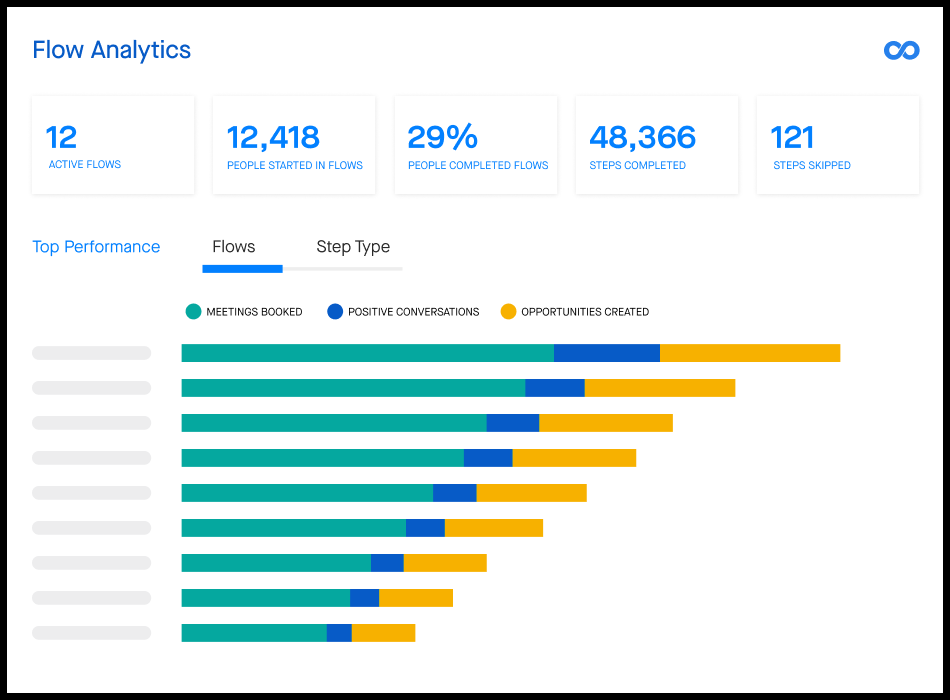
If you’re looking for a comprehensive, all-in-one platform that helps you automate and personalize outreach across multiple channels and multiple personas, then Groove by Clari may be the choice for you.
Features
- Automation lies at the heart of the Clari platform. Reps can automate personalized multi-step follow-up flows across various channels, including email, SMS, LinkedIn, calls, and more.
- You can even automate A/B tests inside the platform, allowing your reps to find and implement the most effective outreach cadences.
Pros
- Groove by Clari integrates across your workflow, including your email client, calendar, and CRM. It updates Salesforce in real-time, surfacing relevant engagement history and alerting sellers about revenue-critical actions and tasks.
- You can chop and change between pre-built cadences (called Flows) to match the right engagement message to your audience and overcome any objections.
Cons
- Because of the comprehensiveness of Groove’s offering, it can take time to get comfortable using it. Luckily, there’s a wealth of training material to help.
Pricing
- We tailor pricing to your business needs. Get in touch for a bespoke quote.
2. Salesloft
Salesloft is an enterprise sales platform for building and growing your sales pipeline. We’re only interested in its Cadence offering here, which helps you automate and personalize your outreach process.
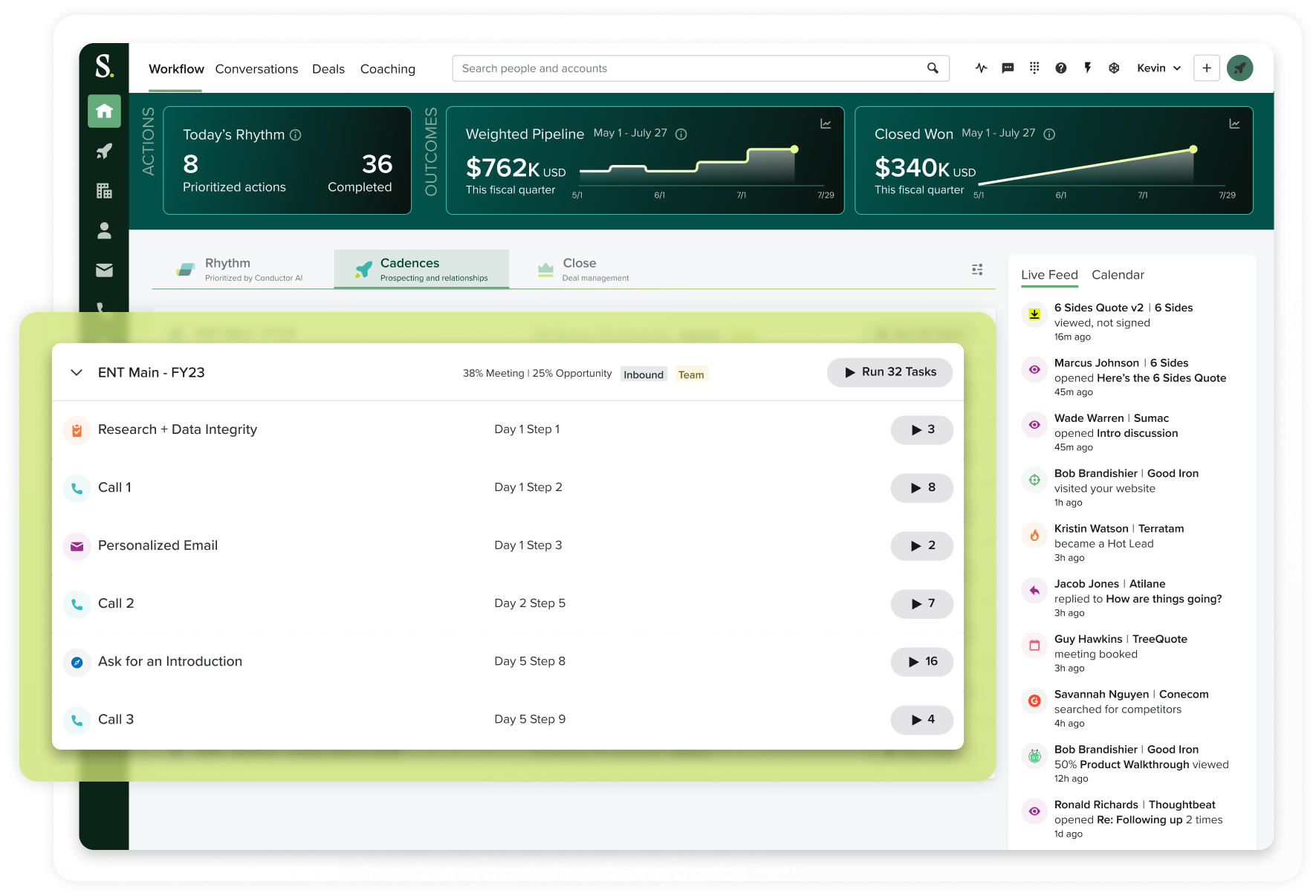
Features
- Generative AI is a big part of the Salesloft platform, helping reps to draft emails and personalize outreach at scale.
- In-built A/B testing helps reps find and refine their best cadences. The platform’s Rhythm feature prioritizes buyer engagement.
Pros
- All outreach interactions are automatically logged in your CRM, eliminating the administrative tasks reps must complete.
- You can access Salesloft from any web browser or smartphone, allowing you to take work with you on the go.
Cons
- Salesloft can be a complex and unwieldy beast. It may be too large and convoluted for all but the biggest sales teams to use effectively.
Pricing
- Pricing is available on request.
3. Mailshake
If you want to automate email and LinkedIn outreach messages, you could do worse than Mailshake’s AI-powered sales engagement tool.
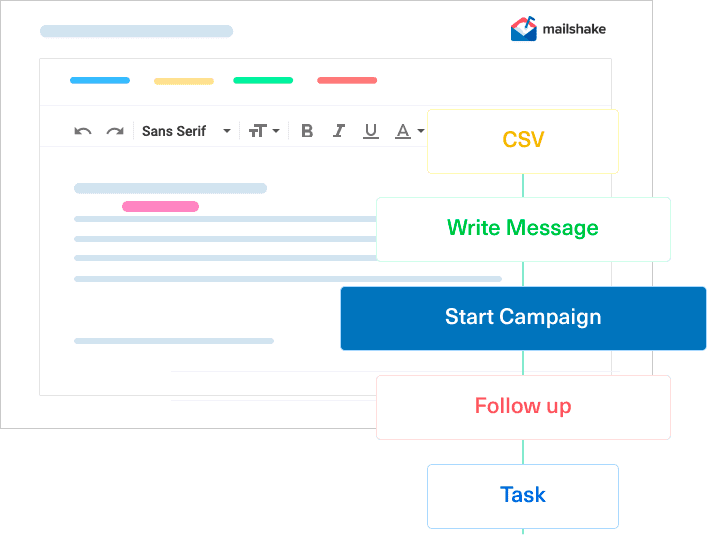
Features
- Mailshake is one of the few tools that lets you automate LinkedIn outreach, saving your reps hours.
- The platform also has a good AI writing tool to help reps create engaging emails faster.
Pros
- The platform has a built-in email deliverability tool that increases the likelihood of your messages landing in your prospects’ inboxes.
- The platform is very intuitive and easy to use. It guides you through creating your first campaign, making it easy for inexperienced reps to get started.
Cons
- Mailshake is only really useful for outreach. It won’t help you find more prospects or create detailed reports.
Pricing
- Mailshake’s Starter plan costs $29 per user per month.
4. Klenty
Reaching out to prospects across multiple channels will inevitably increase your team’s reply rates — and few platforms come close to Klenty’s multi-channel outreach capabilities.
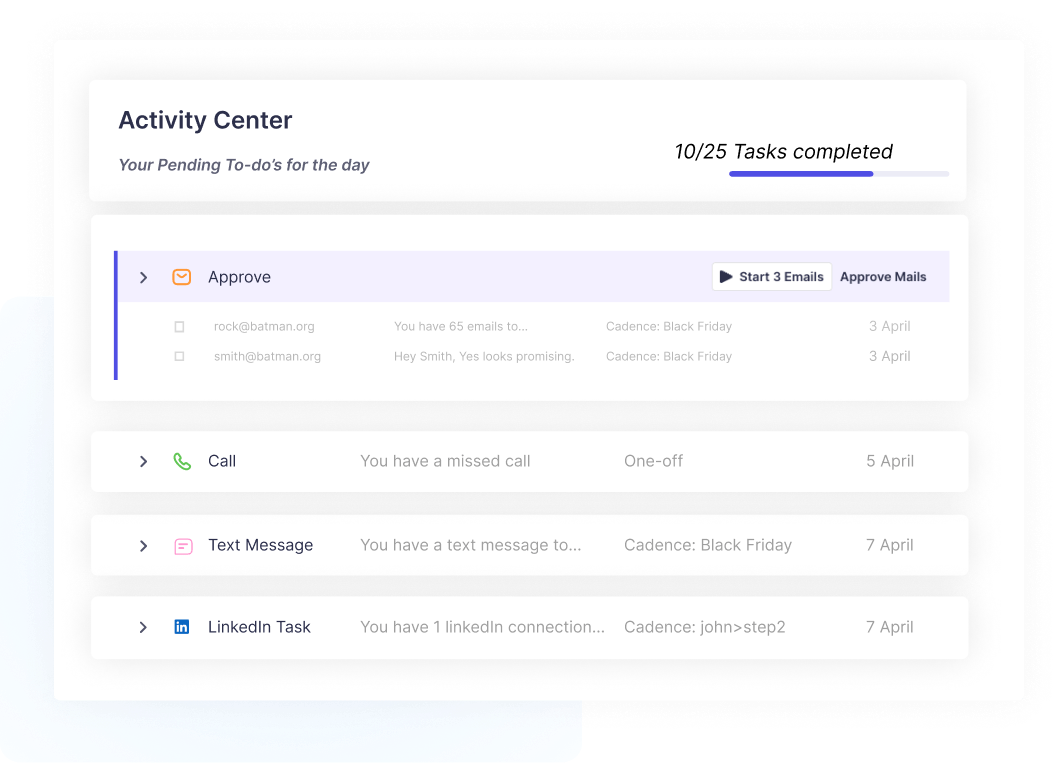
Features
- Klenty lets you combine phone calls, emails, LinkedIn messages, SMS, and even WhatsApp in a single sequence.
- The platform features a parallel dialer, which lets reps call five prospects simultaneously, so you don’t have to wait long for an answer.
Pros
- Klenty lets users filter prospects based on intent to buy so they don’t waste time on irrelevant customers.
- The company offers pretty good support with dedicated onboarding and ongoing one-on-one calls to help you find value.
Cons
- You can't automate LinkedIn messaging for all the platform’s multi-channel capabilities.
Pricing
- Klenty’s Startup plan costs $60 per user per month when billed quarterly.
5. Outreach
If you want to include AI in your sales engagement efforts, Outreach has a range of tools you can dive into.

Features
- One of the platform’s most powerful AI features is a sentiment insights tool that helps your reps overcome objections and increase their reply rates.
- There’s also out-of-office detection, which automatically pauses campaigns when an OOO reply comes in.
Pros
- The platform comes loaded with proven templates to set up workflows faster.
- Integrated A/B testing helps your team prove which cadences work best and then scale them to every campaign.
Cons
- The platform’s reporting capabilities are limited and may be insufficient for some sales teams.
Pricing
- Pricing is available on request.
6. Lemlist
If you prioritize email outreach above everything else, a sales engagement software that only does email and email may be just the ticket. That’s Lemlist.

Features
- Lemlist makes it easy to find people to email. The platform has a database of 450 million contacts and a Chrome Extension that lets you gather prospect data while browsing LinkedIn.
- You can create incredibly rich emails with Lemlist and attach images and dynamic landing pages to your emails.
Pros
- Your reps can increase their email deliverability rates thanks to Lemlist’s warm-up service.
- In-depth analytics makes it easy to understand your campaigns' performance and where reps can improve.
Cons
- While Lemlist offers a Chrome Extension, there’s a lack of integration with LinkedIn, so you can’t send emails through Sales Navigator.
Pricing
- Lemlist’s Email Starter costs $39 per user per month.
7. Reply
Imagine if you could automate the entire LinkedIn outreach relationship. With Reply, you can do a range of automated and semi-automated steps.

Features
- Reply makes social selling as easy as possible. You can use the platform to automatically engage with LinkedIn contacts, including requests to connect, sending a message, viewing a profile, and liking recent posts.
- If you prefer, you can use Reply’s massive B2B contact database to find relevant potential customers. It has over 85 million contacts at the time of writing.
Pros
- Reply is a great tool for finding prospect contact information. It automatically shows decision-makers at each company.
- A ChatGPT-powered AI tool makes it easy to create compelling outreach emails in seconds.
Cons
- If you’re managing your emails in Reply rather than Outlook, you’ll be delayed when receiving emails.
Pricing
- Reply’s standard platform costs $59 per user per month.
8. Yesware
You don’t need to open a separate application on your laptop to automate your sales engagement. Yesware lives inside Gmail or Outlook, so switching tools is unnecessary.
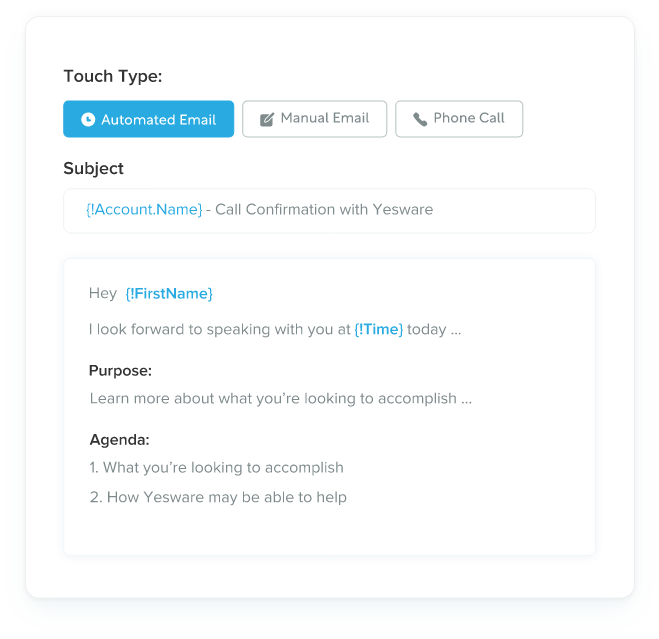
Features
- Yesware boasts detailed email tracking, which tracks when emails are opened and counts them as activity in Salesforce. It can even track attachment opens, too.
- The platform also has a personalized email template library, which makes it faster for sales reps to fire off replies.
Pros
- Yesware integrates seamlessly with Gmail or Outlook, meaning your reps have fewer apps to juggle.
- Yesware scores recipient engagement so your sales reps can focus on the best leads.
Cons
- Yesware lacks the flexibility of other platforms. For instance, there’s no way to edit campaigns after they’ve launched.
Pricing
- Yesware’s Pro plan starts from $19 per seat per month.
9. VanillaSoft
Don’t you hate not knowing which prospects are worth your time? VanillaSoft’s sales engagement platform solves this while automating your sales process more than any other tool.
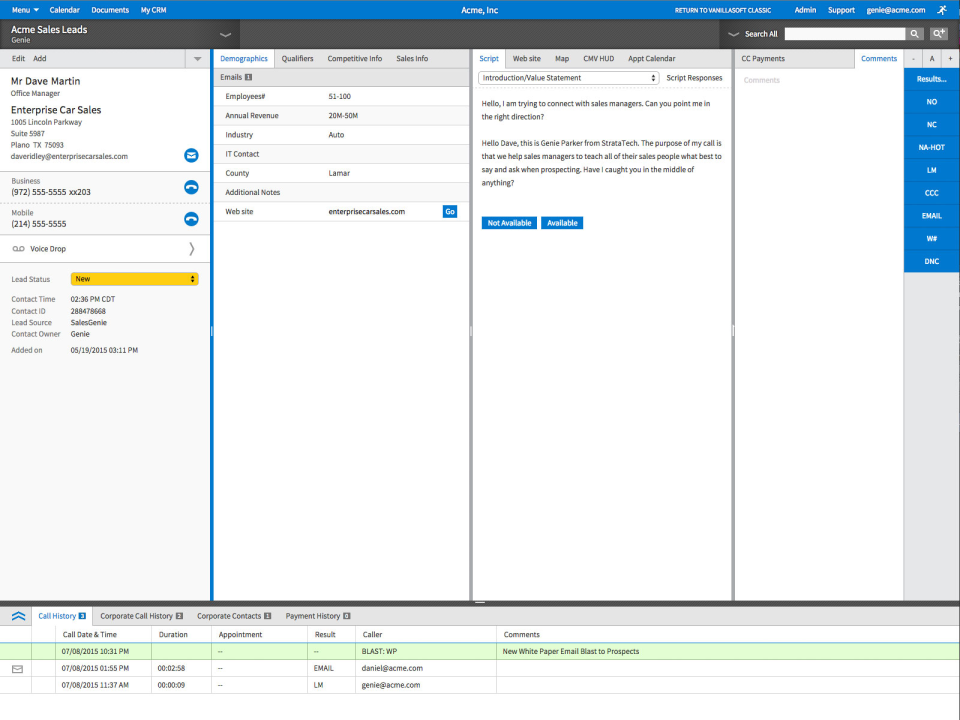
Features
- VanillaSoft’s software features a lead prioritization tool that automatically places the best leads at the top of the queue. The result? Your reps tackle them first.
- Several other features make it easy to book meetings with prospects inside the platform. This includes seeing multiple calendars and booking meetings in the same area at similar times.
Pros
- Automation is a massive part of VanillaSoft. The platform has several features, such as auto-dialing and email sequencing, saving your reps a lot of time.
- VanillaSoft offers a very high level of support, including a resource center and one-on-one training.
Cons
- VanillaSoft packs a lot of features into one platform, so the software can lag if many users are on it at once.
Pricing
- Prices start from $110 per user per month.
10. Apollo.io
If you want to find thousands of new potential prospects before you automate outreach, Apollo.io could be a good choice. This sales intelligence and engagement platform has one of the most extensive lead databases and some of the best filtering options.
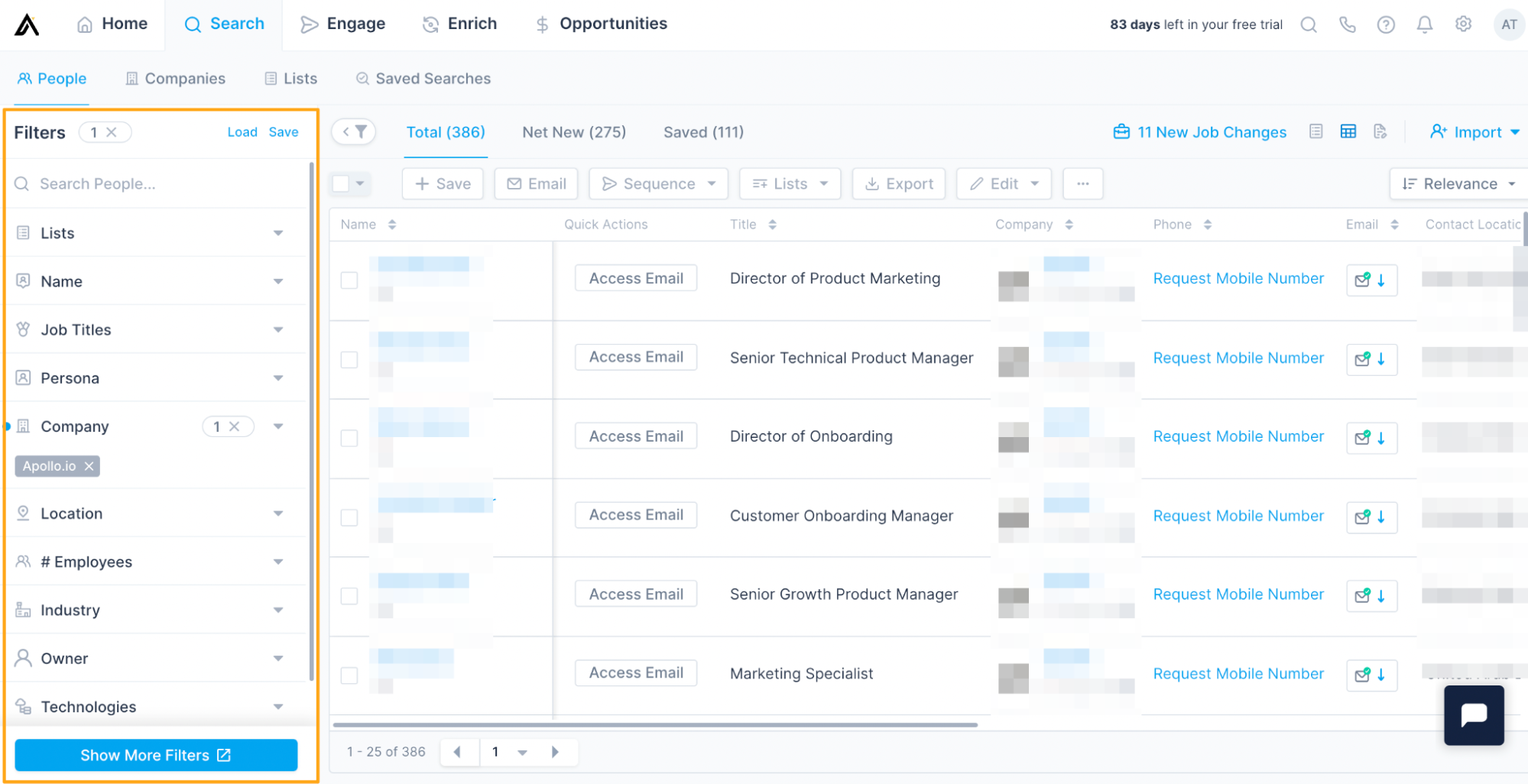
Features
- Apollo.io has an enormous B2B contact base (over 275 million contacts at the time of writing), which includes emails and phone numbers. This makes it one of the best list-creation tools.
- The platform’s multi-channel outreach automation means you aren’t limited to email outreach.
Pros
- Apollo.io’s Chrome extension makes it easy to find contact information when prospecting on LinkedIn and add them to existing lists and sequences.
- The platform integrates with SendGrid, a specialist mass emailing provider, increasing deliverability.
Cons
- Apollo.io doesn’t have a mobile app, so sales reps can’t use the platform on the go.
Pricing
- Apollo.io’s basic plan starts at $59 per user per month.
How do you know which sales engagement automation platform is right for you?
How do you decide which of the ten platforms above is right for you? We recommend condensing our shortlist by considering the following factors:
- What features do you need? The above tools have a wide array of features. Some do one specific task well; Others are more comprehensive. We recommend going broad where possible. Most businesses will want a tool that helps them find AND message clients. There’s a good chance you’ll want to automate multi-channel outreach and reporting, too.
- Does the tool integrate with your CRM? This is an easy one. If you use a popular CRM like Salesforce, it’s probably safe to say an integration is available. But double-check this if you use a smaller provider.
- Does the tool align with your budget? There can be quite a big difference in the cost of these tools, so make sure you calculate the total cost of each tool for your entire sales team. Some charge per user per month, while others have bespoke pricing models. But just because the price isn’t listed doesn’t mean the tool is expensive. Request a quote before making your decision.
What's next?
If you’re looking for one sales engagement platform that automates almost everything, choose Groove by Clari. That includes:
- Automated Salesforce updates
- Automated follow-ups across almost every channel, including email, SMS, and LinkedIn
- Automated notifications of actions reps need to take
